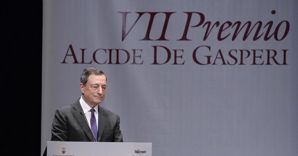The recovery continues, but is moderated, with “a momentum of slightly less than expected in June”. That is how it began the hearing of Mario Draghi to the european Parliament: nothing new but confirmation that the prospects for the Eurozone are still rather weak. Slow growth (+1.6% in 2017 and 2018), low inflation, which will rise next year only because of “the impact of past declines in oil will disappear” (and so it will be a rise in the index, not a true increase in inflation). It is, however, Governments – warned – “unleash growth”.
Draghi has not wished to emphasize the difficulties and missed successes of monetary policy, which, from his point of view, has obtained important results: the standards of granting of the credit, he explained, have expanded, extraordinary transactions (purchases of bonds, corporate bonds and Tltro-II) are lowering the costs of financing of “important actors in our economy” (even if the investment respond little to exchange rates, interest…), without forgetting the Smes: “The big companies have an incentive to get more financing from the market of the bond, thus leaving more space in the balance sheets of the banks to grant loans to small-and medium-sized enterprises”.

The warning of the Dragons: take into account the “needs and fears” of the europeans
The monetary policy has also benefited from all. The situation of fragmentation of the Euro zone which was evident a few years ago has improved, he said Dragons. The measures of the Ecb now reaches all the countries. “From October 2012 to July 2016, the composite indicator of the cost of credit for new loans to companies non-financial assets fell by almost 287 basis points in Portugal and points in Italy, compared to 117 basis points for the euro area as a whole”.
The message that is at the heart of the Ecb is that monetary policy can’t do everything. In some countries – Germany first and foremost – it had to do with the low level of interest rates, which is detrimental to savers, insurance companies, pension funds. “The low interest rates – has, therefore, reiterated Dragons – are the symptom of the economic situation underlying: reflect a weak tendency for long-term growth and the prolonged collapse in macro-economic which was the result of the crisis.” He, however, admitted, even if it is not the first time, that keeping rates low for a long time can generate risks.
above all, the Ecb “cannot determine the sustainable level of real interest rates in the long term, which depend on the growth prospects of the long term”. This is the role of the other “political actors”: “to pursue fiscal and structural policies that will contribute to a recovery that will sustain itself and increase the growth potential of the Eurozone”.
Brexit is, therefore, in the background, even if it is not disappeared altogether: it has not had for now a great effect, the Eurozone has shown to be “resilient”, resilient to shocks, but the uncertainty of the baseline scenario of the Ecb “remains subject to downside risks”. On the negotiations, he added that Britain should not be granted favourable treatment, to prevent forms of discrimination among the countries: “it Would be difficult to imagine that an agreement perceived as discriminatory towards certain subjects, or in favour of other subjects may be a source of stability for the future of the Eu”.
The output of Great Britain, however, poses the, according to him, a different challenge, all policy. “It is important to ensure that the Eu responds to the expectations of its citizens”, is the message of Dragons. The projects of the Eu must focus on the immediate concerns of the people, and “for those challenges which clearly go beyond national boundaries, efficient solutions require joint actions”. His explicit reference should be to migration, defence and security.
governments to help the Dragons to secure the future of the european Union
Learn more
Equally important is that you feed “trust between nations and people” and for this reason the “shared rules must be respected”. For the Eurozone, in particular, this will allow you to “avoid imbalances which might destabilise the area.” In any case, “the actions of national governments are necessary to unleash the growth, reduce unemployment and give the opportunity” (empower, is the word he used) to the people, offering at the same time protection for the most vulnerable”.
The tax plan, the countries that do not have room for manoeuvre should intervene on the composition of public budgets. Many of these countries “over the past 10-15 years that preceded the crisis have increased public spending, but their growth has remained stagnant or very very small”, said Draghi. The countries with “space” to intervene, he added, should it use all: she has then detected an asymmetry among the countries to which it is forbidden to spend more, and the countries to which it is not required to have a policy more expansionary.
it is Not a failure, finally, a call to the completion of the integration process, and in particular the banking Union and the Union of capital markets. The dragons wanted to end his introductory speech with a quote from Carlo Azeglio Ciampi, who died recently: “the euro is the biggest demonstration of the united will of the european citizens, and a driving force for policy integration”
In response to questions from meps, mr Draghi has also stated that “there are important initiatives that will lead to a consolidation of the banking sector”. “There is a very high number of banks in almost all countries of the euro area,” he added, explaining that “there are many hundreds of small banks that do a very good job for their clients, and there are other banks that can be consolidated”. Did not want to comment, finally, the situation is “specific” to Deutsche Bank.
© Reproduction reserved
No comments:
Post a Comment